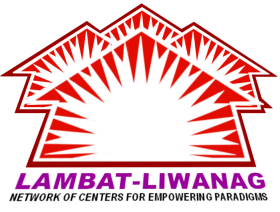|
6
|
6. Culture as Community Creativity
|
 Culture as community creation, property and patrimony
Culture as community creation, property and patrimony
 Critique of overspecialized artistry and star system as elitist and
separative in bases and consequences
Critique of overspecialized artistry and star system as elitist and
separative in bases and consequences
 Holistic view of culture as synergy of collective value-systems and
practices of the community
Holistic view of culture as synergy of collective value-systems and
practices of the community
 Interrelation and balance of aesthetics and functionality
Interrelation and balance of aesthetics and functionality
 Community's cultural identity and enrichment as a component of
collective self-respect and as basis for assimilation
Community's cultural identity and enrichment as a component of
collective self-respect and as basis for assimilation
|
THE 15 EMPOWERING PARADIGMS: |
1.
Total Human Development and Harmony Through
Synergism
2.
Holistic Health Care and Medicine
3.
Deep Ecology and Harmony with Nature
4.
Sense of History and Sense of Mission
5.
Civics and Democratic Governance
6.
Culture as Community Creativity
7.
Light-Seeking and Light-Sharing Education
8.
Gender Sensitivity, Equality & Harmony
9.
Reconstructive/Restor-ative Justice
10.
Associative Economics, Social Capital and
Sustainable Development
11.
Synergetic Leadership and Organizations
12.
Appropriate/Adaptive Technology
13.
Mutual Enrichment of Families and Friendships
14.
Human Dignity and Human Harmony: Human Rights and
Peace
15.
Aesthetics Without Boundaries: 'Art from the
Heart'
. |

Nature of Man and Culture*
Edited
By
Baidyanath Saraswati
From: The Nature of Man and Culture : Alternative Paradigms in Anthropology, edited by Baidyanath Saraswati. Delhi, Aryan, 2001, 175 p., ISBN 81-7305-196-8.
Jacket Description of Content:
“THE NATURE of Man and Culture is a response to the relentless search for alternative paradigms in anthropology. Presented here are contributions from a distinguished group of experts from India, Kenya, Korea, Venezuela, Mexico and USA. Anthropology based on the premises of a materialistic science does not answer but raises questions about man. As for secular western science what is one to think?
Are other modes of thinking possible outside the modern scientific horizon? Are there no visions of man, no other pillars of truth? Must everything be aided only by reason? Must an African, an Indian and a Chinese be uprooted from the nature-integrated culture? Can one observe the hidden variables of another culture? Do we have to follow the Darwinian – Tylorian – Durkheimian – Morganian – Malinoiskian anthropology, with no real choice at all? Or do we look for a new understanding?
“To answer such central questions, the authors of this volume reflect on sacred science, space and time, experience and expression, and question of universality. An effort has been made to ‘re-language’ traditional thought in terms of sacred science, cosmic anthropology, sonic anthropology, philosophical anthropology, quantum anthropology, experiential anthropology, people’s anthropology and so on. This book is an important contribution to the field of anthropological studies and an invaluable tool for anyone interested in a deeper understanding of human nature and culture.”
Contents:
Introduction.
I. Sacred science:
1. Alternative paradigms in anthropology: the cosmic anthropological principle/Baidyanath Saraswati.
2. Views on man and his nature in Indian philosophy/Makhan Jha.
3. Concept of self in Indian culture/N.K. Behura.
4. Philosophical anthropology in the discourse of Sufism/A.R. Momin.
5. Anthropology of sound/Onkar Prasad.
II. Space and time:
6. Cultural concepts of space and time/Molly Kaushal.
7. Universalities & specificities in the African conception of space and time/Osaga Odak.
8. The paradigm of self-organization from village to pilgrimage/J. McKim Malville.
III. Experience and expression:
9. Dynamics of cultural communication : anthropology of experience/S.C. Malik.
10. Understanding a culture experientially/Anjali Capila.
11. Dance as communication with the cosmos/Yolotl Gonzalez Torres.
IV. Question of universality:
12. Paradigms of next century/Rafael Lopez-Sanz.
13. Toward the development of anthropology relevant to the study of Korean people, society and culture/Han Sang-Bok.
14. Alternative paradigms in anthropology at the confluence of categories from indigenous and global knowledge systems/Jan Brouwers. Index.
|
*
The inclusion of this article in the holdings of the
Lambat-Liwanag On-Line Library
is an indication that we are strongly recommending this for
perusal by serious students of the Empowering Paradigms. We
have not been able to secure information as to whom and at
what address we should write in order to request official
permission for its inclusion. As soon as we receive
such information, we shall seek the permission, and if such
is officially denied, we are ready to remove this item in
this collection, albeit reluctantly.
We can be reached via
lambat_liwanag@yahoo.com.
|
back to top  post a comment
post a comment
|
|
Created
and
Maintained
for

by
our 'cyber arm':

TIMES
VISITED:
 
|
|
To
open the lambat-liwanag main site, please click
here. |
|
LAMBAT-
LIWANAG
Network
for
Empower-ing Paradigms
(formed in
2001)
is proud to be a founding member- organization of

formalized
in its 1st General Assembly last November 15, 2008
click
here
for info. |
|
For
info on these fraternal organizations
of
KAMALAYSAYAN within the family of
PAMAYANANG
SANIBLAKAS,
click
here
PAMAYANANG
SANIBLAKAS
MEMBER
GROUPS:
Advocates
of Cooperative Education on Synergism
Consumers
& Communicators for Truthful Information
Galing-Pilipino
Movement
Kaisahan sa Kamalayan sa
Kasaysayan
Kaisari
Movement for Gender Harmony
Kilusang
Kartilya
Kilusang
Lakas-Pamayanan
Lambat-Liwanag
Net- work for Empowering Paradigms
LightShare
Digest (magazine)
LightShare
e-Mail List Group
Living
Learnings League
National
Economic Protectionism Association
SanibDasal
Synergetic InterfaithPraying Comm'ty
SanibLakas
ng mga Aktibong Lingkod sa Inang Kalikasan
SanibSigla
Movement for Holistic Health
Sanib-Sining
Movement for Synaesthetics
SYCONE Humanity
Tambuli
ng Dakilang Lahi (magasin)
|
| |
|

Keep
the Flame of Truth Alive in our Hearts!
|
|